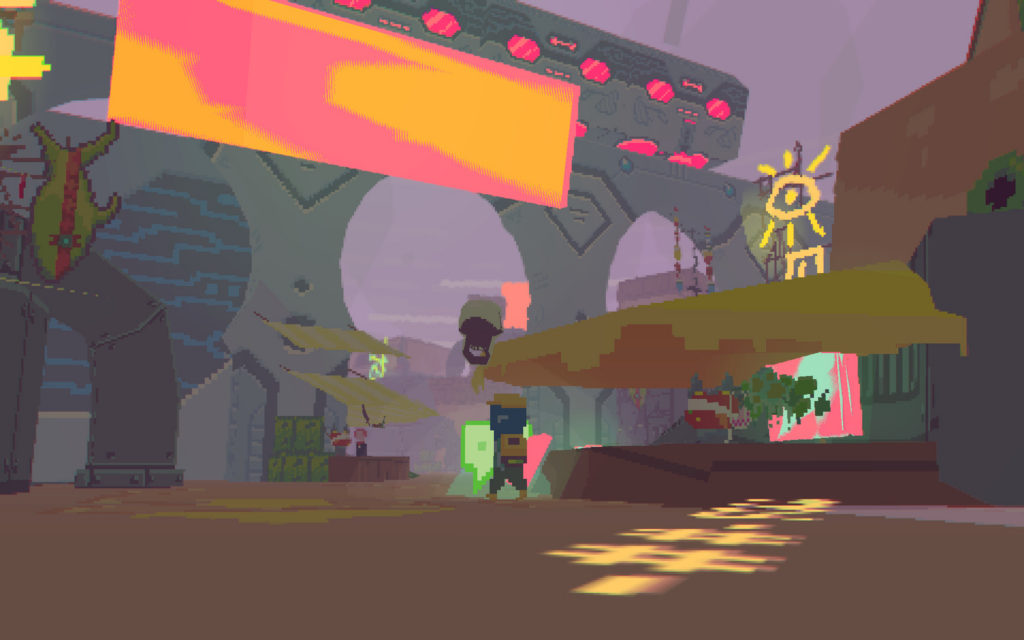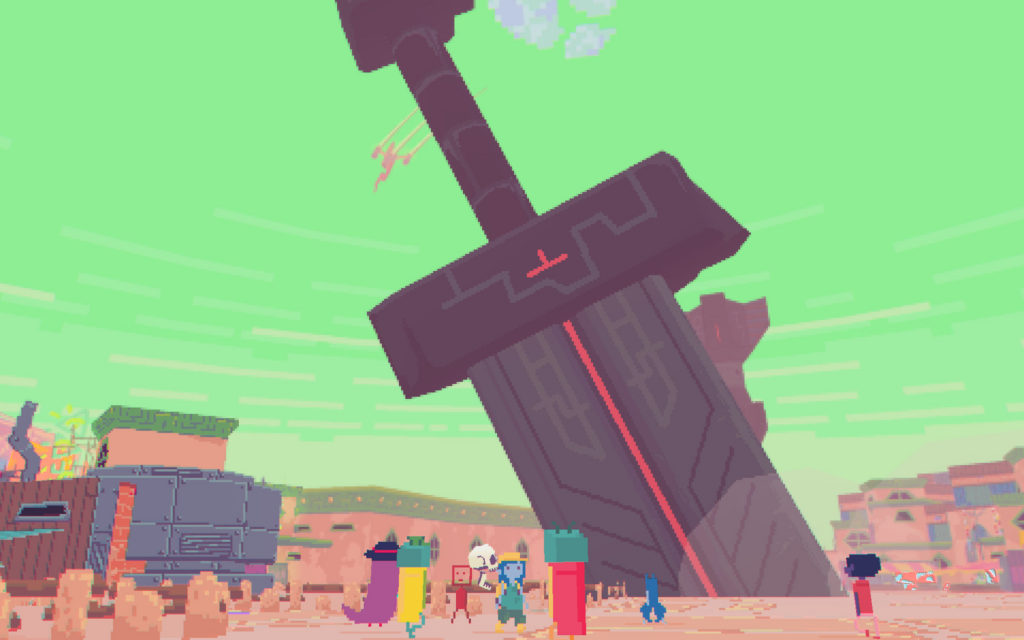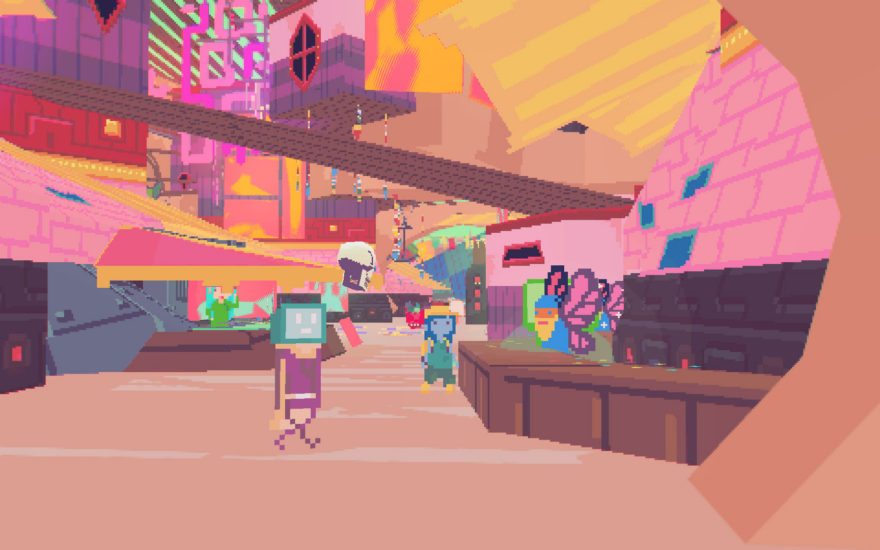There is a sense, in videogames particularly, that the greatest science fiction is that with the budget to match its ideas. Most sci-fi games seem engaged in a kind of arms race, a process of trying to out-tech and out-spectacle each other with increasing elaborate retellings of the “save the galaxy” narrative. Yet, in many ways this is the realm of the blockbuster, not of science fiction as a genre. The most impactful sci-fi of the past was not that which hammered the most fancy widgets onto a five-act quest structure, but that which abstracted, twisted, and expanded the struggles of its time into a fantasy of technological growth and societal tension.
Think of Philip K. Dick’s 1960s existential struggles with mind-expanding substances, heightening the paranoia enforced by a McCarthyist regime. Or William Gibson’s vision of technological subcultures, which grew from the explosion of home computing in the 1980s and the acceleration of rampant financial inequality. Even the 1990s had Neal Stephenson, generating surreal self-aware fictions from the latent energy of the dot-com boom. Science fiction is that dark, twisted mirror we hold up to our world, a form which is as innately human as it is technological.
Diaries of a Spaceport Janitor is a game in that tradition. From first impressions, it appears to be a loop of pleasing routine, packaged in the cute colors of a Star Wars pixel-art demake. It seems like a game interested in providing the player with a space in which to live and thrive, rather than a linear adventure to undertake. Yet Spaceport Janitor quickly upsets this idea. Putting you in the shoes of an androgynous blue-skinned street cleaner, the game abandons you to a world that doesn’t care about a thing you do, as long as you do your job. That job is a simple one: wander the streets of the spaceport and incinerate the trash you find.
Each day follows the same pattern of waking up, collecting your pay (always less than you thought), trawling the streets, haggling for food, getting lost, getting tired, and stumbling home to sleep. At every turn the game reminds you of your lowly position in its brightly-hued society; the insults hurled at you by the local law enforcers, the exorbitant food costs that eclipse your wages, the crowds you navigate as if you were invisible. While the likes of Animal Crossing, Stardew Valley, and Harvest Moon place their protagonist at their center—the shops, services, and systems of their worlds built to provide for every need—Spaceport Janitor does the opposite, constantly enforcing your hand-to-mouth lifestyle with each moment. It doesn’t do this through scripting or an overbearing narrative of dejection and depression, instead it simply sets up the systems and lets you build the narratives in between. The result is a precise portrait of what it means to be young and poor in contemporary society.

On top of this societal disconnection, the game adds a physical dimension—the need to switch gender. Every couple of days, static clouds the screen, text scrambles, and the world wavers as if it were a mirage. This worsens as long as your gender remains unchanged, a process which, though simple within the confines of the game, is often beyond the money you have left at the end of the day. If this wasn’t enough, the game also labors you with a curse—a skull which dogs your steps, occasionally and unexpectedly screaming in your ear. Though I have no experience of gender dysphoria, Spaceport Janitor clearly wants to put its players through a highly abstracted version of a very personal experience; the discomfort and distress that emerges from pronounced “difference.” The combined effect of the societal systems and this physical distress means that Spaceport Janitor forces you into a place of precarity and poverty, where survival, not success, is your daily focus.
To survive Spaceport Janitor you have to rely on what you can find thrown away on the spaceport streets, which it turns out is quite a lot. Spaceport Janitor does its best storytelling with these little pieces of trash and their descriptions. A “Hi-pleasure chip” can’t be used because the player doesn’t “have the necessary bioport,” and an “adventurers wanted” flyer (complete with tear-off strips) suggests that a fantastic escape might be just one phone call away. Some of these items have potential value at the city’s constantly shifting set of market stalls, others are totally useless. Either way, if you don’t incinerate them, you won’t get paid. This choice between holding onto something potentially useful or interesting versus incinerating it and getting on with your day gives each new discovery a moment of tension. The odds are stacked against you, of course, with the chance of finding an expensive item and then selling it to a shop that will take it being very low, and yet the rewards for such a moment are huge. And perhaps even more tempting is the carrot of adventure and dungeon crawling that the game constantly dangles under your undernourished nose.
Though Spaceport Janitor’s main quest (ridding yourself of that screaming skull) brings you to the border of the world of adventurers and explorers, the game still keeps you strictly on the outside. It plays on expectations of the genre with care, constantly feeding the hope that we might be taken in by the mages guild, or be rescued for a life of adventuring with a team of aliens in tow. This tendency for daydreaming is carefully supported by the game’s setting. This is no downbeat contemporary city or gritty sci-fi wasteland. In sharp contrast to its often punishing structure, the spaceport is the brightest of sci-fi worlds, buzzing with a seemingly endless stream of strange creatures, occult weapons, mysterious technology and ancient artifacts. It’s less Star Wars and more Adventure Time or Samurai Jack, appropriating and remixing with an infectious energy. This is a fantasy after all, and its layering of RPG tropes into its dulling systems of daily routine inject it with a clever twist. It feels like arriving at recognizable territory from a different angle, not quite a parody and not quite a tribute, but somewhere between, nestled in the fantasy and the reality of both our own world and the science-fiction worlds it has spawned.

Within this lively fantasy, Spaceport Janitor homes in on big, powerful themes: inequality, identity politics, division, and the precarity of the young. The game positions itself around these issues not because of some high-concept intention, but because it was built by people whose experiences were forged in the pressure cooker of trying to make a living as a young adult in the world today. It claims science fiction for itself, reinvigorating a genre owned by big studios and the power-brokers of our media, as a scrappy, emotional thing; a way of living in both our daily fantasies and our daily realities simultaneously. It is not doing this on its own, of course—you can feel the influence of artists like Porpentine and Nina Freeman, and all those who refuse to make science-fiction games that aren’t personal, weird, or political.
Yet there’s something about Spaceport Janitor that feels so attuned to our times that makes it stand out among these works: its focus on the concept of luck. Luck is Spaceport Janitor’s way of letting you skew things back in your favor. In its world there are nine goddesses, one for each of the nine days of the week. By praying to them, leaving them offerings and avoiding cursed objects you can increase your luck, making you more likely to find valuable trash and win useful items from the daily lottery. Yet, luck can be a tricky thing to manage. Leave a bad offering and you might mess up your chances, incinerate a sacred object and you will find yourself on the wrong side of the goddesses. And stepping on spirals? Sure to bring you bad luck. Spaceport Janitor bombards you with this kind of inane advice, and the esoteric nature of gathering and maintaining luck turns you into a superstitious player, the type who will rub themselves against a giant sword if it means a chance at finding a credit chip. Whether it works or not.
In contemporary society, luck is explicitly connected to one of the biggest features of current political and social debate—privilege. For many in the highest earning and most powerful positions of our societies, luck is the preserve of the failed and the poor. Rather than thinking of themselves as lucky, entrepreneurs, businessmen and politicians often describe themselves as “self-made”. They are, they propose, proof that the dream of social mobility exists, that anyone can make it big with hard work and dedication. Only last week, Oculus founder Palmer Luckey was connected to right-wing meme factory Nimble America by a (now deleted) statement on he made on Reddit saying: ‘America is the land of opportunity. I made the most of that opportunity. I am a member of the 0.001%. I started with nothing and worked my way to the top’. Luckey’s refusal to acknowledge luck in his success is symptomatic of a society where groups still refuse to accept the privilege (regarding gender, race, ability, or class) that allowed them access to positions of power and influence.
In its focus on luck as the sole refuge of your downtrodden character, Spaceport Janitor refuses to accept Luckey’s claim and the prevailing wisdom that hard work is the only thing standing between an individual and their success. Instead, it acutely depicts a reflection of our societies repeated failure to protect those that are most vulnerable, by blaming them for their own systemic oppression. The game’s focus on luck also feels connected to an idea of generosity that is powerful in today’s society. Earlier this year, The Atlantic discussed a series of studies pointing to the idea that those who acknowledge the presence of luck in their own success are more generous with the rewards. Spaceport Janitor’s worldview reinforces this, encouraging the player to find meaning in the play of circumstance. Because, in the end, our only hope for rescue in Spaceport Janitor’s segregated, restrictive society is to turn to the supernatural, the divine, ultimately, the fantastical.

So when chance swings your way on a Theday, and the city comes alive with the tootling of alien trumpets and throngs with every creature you might imagine, it’s possible to rise above the trash, to appreciate the world for what it might be. Even on rainy mornings, where lightning whites out the single window of your scrappy flat, lanterns glowing green by the ceiling, there is a certain melancholic satisfaction to be felt, an appreciation of the process of being alive. I’ve had Onday mornings that felt like the crispest, crystalline fragments of time you can imagine, ready to be shattered by ceaseless onset of my working day,
It’s these delicate moments that point towards the optimism at the heart of Spaceport Janitor. By bridging the gap between our daily struggles and the daydreams that surround them, it suggests that the one space we truly own is our imagination. There is a certain beauty hidden in that sentiment; that it is the fantastic, the surreal, the strange, that might liberate us.
For more about Kill Screen’s ratings system and review policy, click here.
